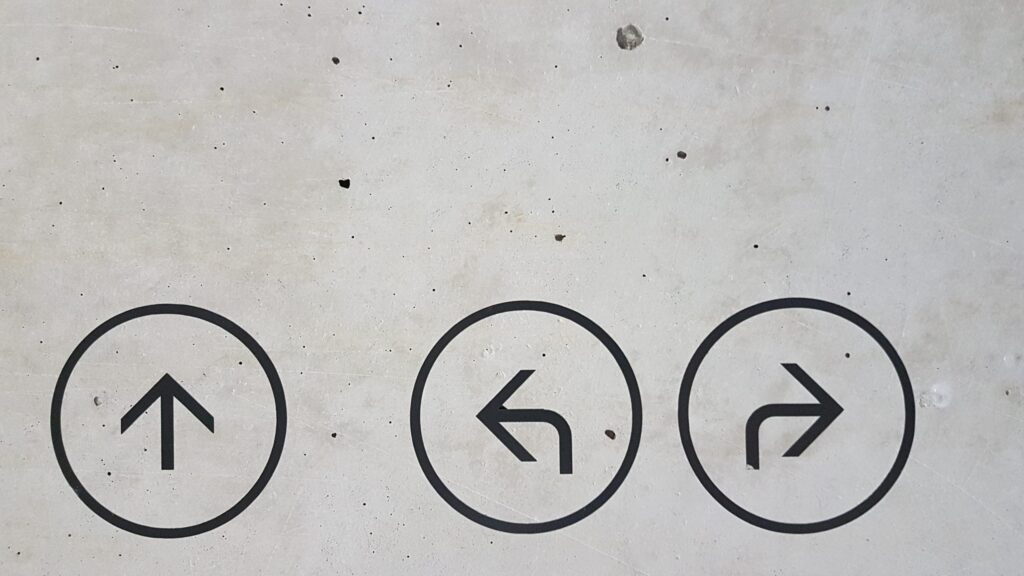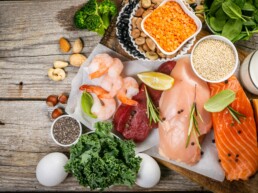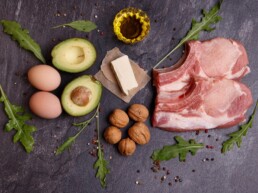There are so many diets out there! How do you figure out which diet you should follow?
“Everyone should eat low-carb.”
“Veganism is the way to save yourself and the world.”
“Saturated fat? It causes heart disease. No one should eat it.”
“Paleo is the way to go. Eat like our ancestors did.”
And then there’s Whole30, Atkins, Pioppi, MIND, raw, Mediterranean, low-fat, low-salt, low-whatever you like!How is anyone supposed to sift through all the data and studies and opinions and ascertain what is right? Is low-carb better than low-fat? Or is the vice versa true? Should everyone eat a dairy-free diet? What is folic acid and why do I need it? What about Magnesium? And Vitamin C? Are grains really the demons they are made out to be? Gluten-free? Can I never eat pizza again? High protein vs high fat… Paleo vs Keto… Or even Ketotarian! The list goes on!
Google + ‘diet’ = 1 billion results in 1.01 seconds!
There is so much health, nutrition and diet-related information available on social media platforms and the Internet. For e.g., search google for the word ‘diet’ and you get approximately 1,13,00,00,000 results in 1.01 seconds! You would need a lifetime to go through and make sense of a fraction of those results.
Where does ‘food and diet’ marketing fit in?
To this tsunami of ‘free’ nutritional advice gets added the often contradictory advertising campaigns of the burgeoning food, exercise and supplement industries. While one company touts the benefits of drinking milk for healthy bones, another insists we should switch to almond milk because dairy is inherently ‘bad’. In the same vein, “Eat more eggs,” says one campaign while another trumpets the benefits of eating cholesterol-lowering artificially sweetened oats.
Honestly, what is a consumer to do?
In addition, to add to all this information overload, there are the cultural or religious diet doctrines that have been passed down through the ages – the way ‘our’ people ate. Traditional cuisines and recipes. Local ingredients. Seasonal produce. Should one even attempt to reconcile these dietary ‘codes of conduct’ with what modern science is saying?
Do diets even work?
As if all these choices are not enough, if you do sign up for a diet that promises untold gains, studies show that diets rarely work in the long run! And if that were not disheartening enough, dieting itself has been found to be predictive of future weight gain!
Does an ‘ideal diet’ exist?
What, then, is a person to do in their quest for good health? Why haven’t researchers flagged one diet as the best diet yet? Why don’t we know exactly which diet we should follow?
Perhaps the answer lies in the fact that there is no such thing as an ideal diet.
Interestingly, studies show that different people do equally well on high-carb, high-protein and high-fat-diets. For e.g. The native Inuit in the Canadian Arctic and the Masai in Kenya thrive on a diet that is largely composed of animal proteins and fats. On the opposite side of the diet spectrum, the Okinawans of Japan eat a largely plant-based diet and are considered to be amongst the world’s longest living people. And in the sleepy little village of Pioppi in Italy, locals live long and healthy lives on a Mediterranean diet of fresh fruits and vegetables, seafood, nuts, olive oil and of course, a sampling of local wine every day!
All of the above examples are of people seeped in their traditional way of living. They don’t buy their food in supermarkets. They don’t have 12-hour workdays. Technology is low-key or missing altogether. The rely on their learned instincts to combine different foods and seek out specific nutrients for treating illnesses. They work, eat, sleep and socialise in environments that are far removed from the lives most of us lead today. Urban environments. Adrift from a traditional knowledge base. Fast-paced, long days at work. No time for physical activity. And easy access to convenience and fast foods. The perfect maelstrom that leads to metabolic imbalances and disease.
Which brings us back to the question…
Which diet, then, should you follow?

All these questions plagued me too as I surfed my way through the heaps of nutrition information and data out there. Until I began examining the science of nutrition with a mind to learn and understand. Over a decade of reading, understanding, learning, self-experimenting, and achieving better health today has taught me one thing:
While some nutrition rules are universal, for e.g. no one should eat excess sugar, transfats are bad for us, protein is a vital macronutrient, functional nutrition is not a one-size-fits-all science. Ultimately, our individual genes, current state of health, and our goals determine what we should and should not eat. This is why I took up the formal study of Nutrition: to learn more about emerging and evidence-based nutrition practices and develop my own coaching style to help my clients navigate through the flood of information out there.
What did I learn?
Did I find the elusive answer to the million-dollar ‘best diet in the world’ question?
Do we have a winner? Which diet should you follow?
Now I know this may sound confusing, but stay with me here. The short answer is, none. The long answer is, the one that best suits your goals as well as your beliefs, palate, and ability to stick with for the foreseeable future. The reason I say this is because I really don’t believe that ‘flash and crash’ one-size-fits-all diets work. The only approach that does work if you are seeking to use nutrition to heal your metabolism and prevent disease is the one that you can follow consistently.
Playing with nutrition is a long game: a marathon, and trying to sprint to the finish line just does not work.
First, figure out what you want to achieve. Then, set some smart health goals for yourself that take into account what you can realistically follow for the foreseeable future. And lastly, start making consistent progress in the direction you have chosen, keeping in mind that achieving health goals is a function of effort spread over time. This, then. is the only ‘diet’ you should follow!
SHARE

Madhavi Shilpi
Nutritionist
Prediabetes Coach
Related
Proteins: Building Blocks for a Stronger You
Are you curious about the role proteins play in our diet? Do you wonder…
Carbohydrates: Fuel For Your Body
Do you often wonder about the role carbohydrates play in our diet? Did…
Fats: A Balanced Perspective
Fats are good for us. Fats are bad for us. The argument rages on. Is there a…
Probiotic-rich foods: 10 health benefits
Probiotics are live microorganisms that are beneficial for our health when…
Nut Butters: Are they healthy for you?
Nut butters are finding a fervent following amongst health food enthusiasts…
Nutrient focus: Vitamin D
Vitamin D: The Sunshine Vitamin and its Importance to Your Health Vitamin D is…
What is Prediabetes?
Have you been diagnosed with Prediabetes? Are you wondering what it actually…







